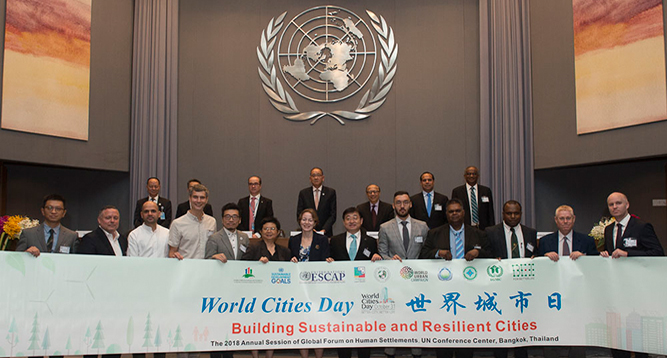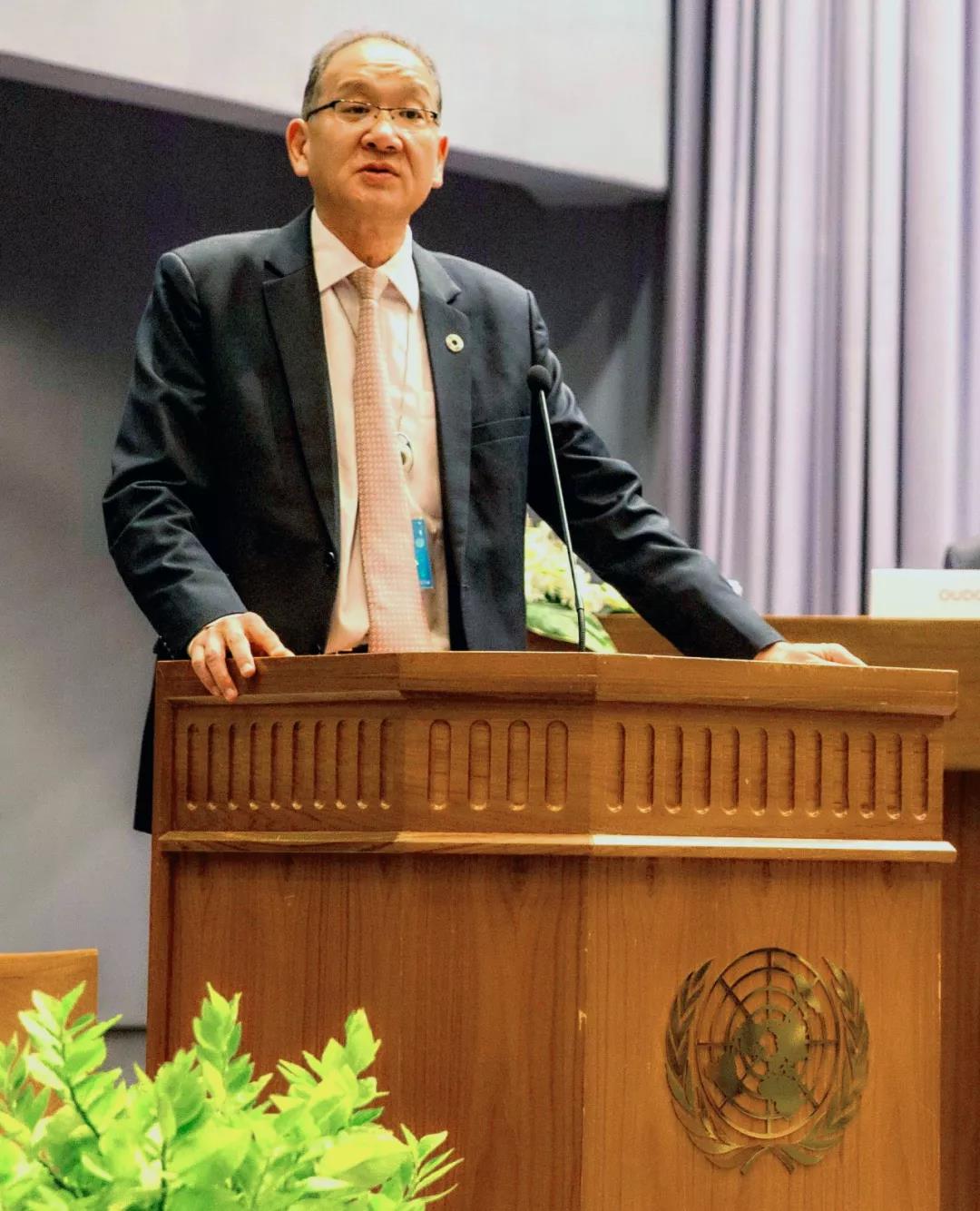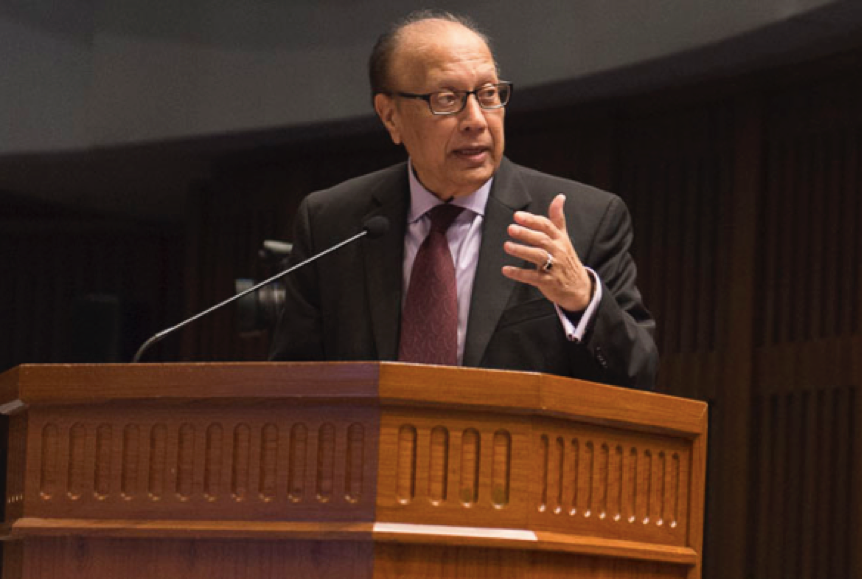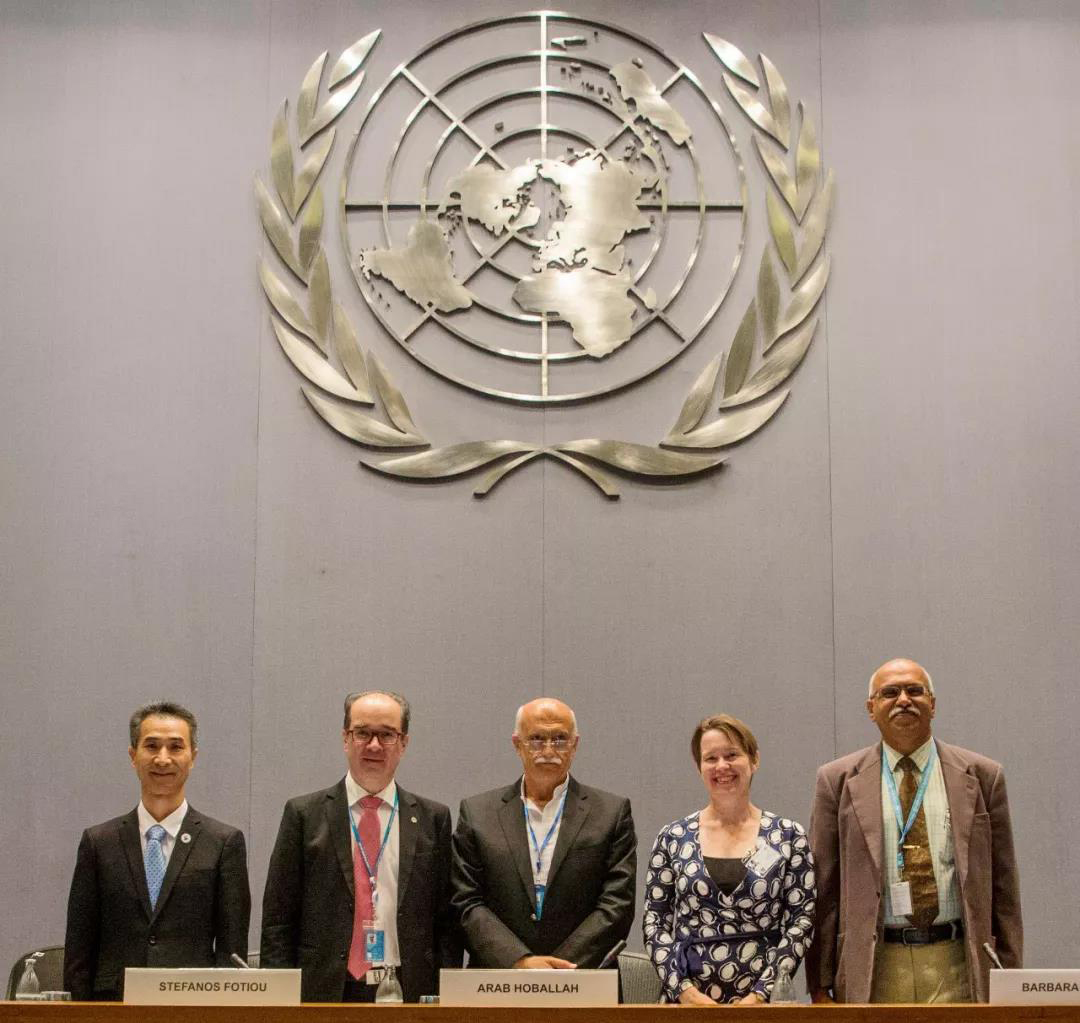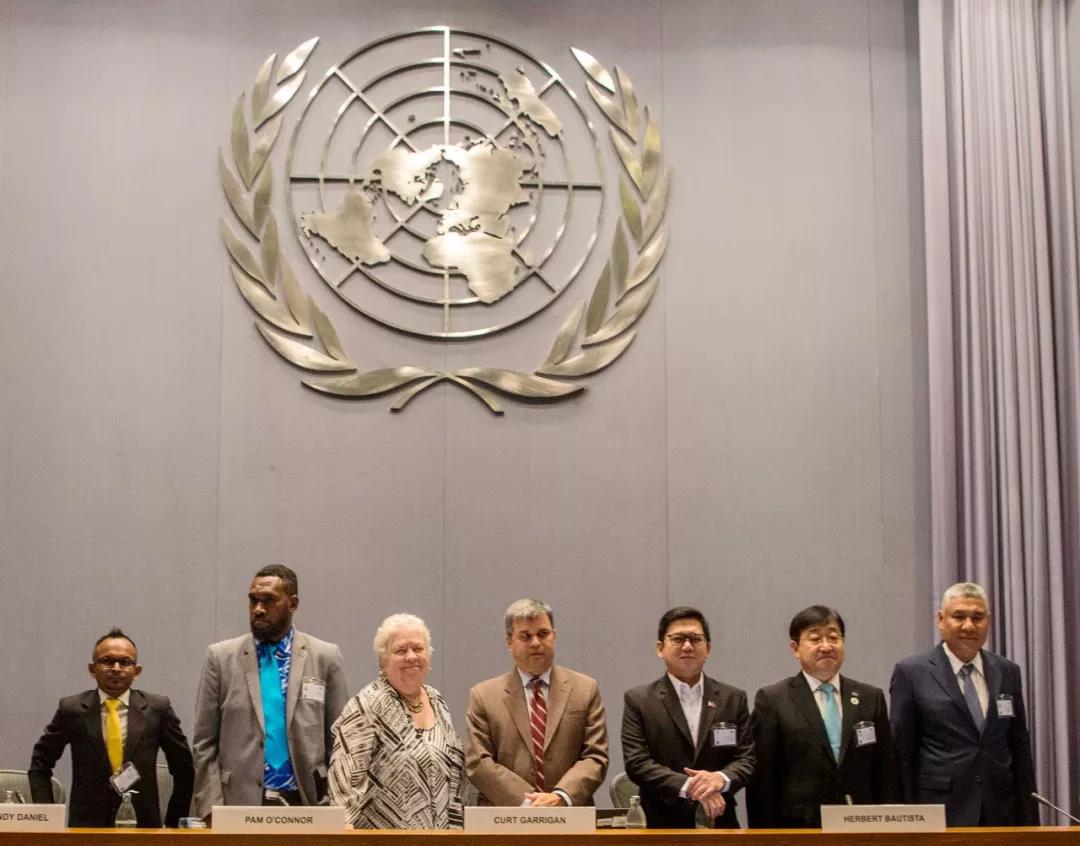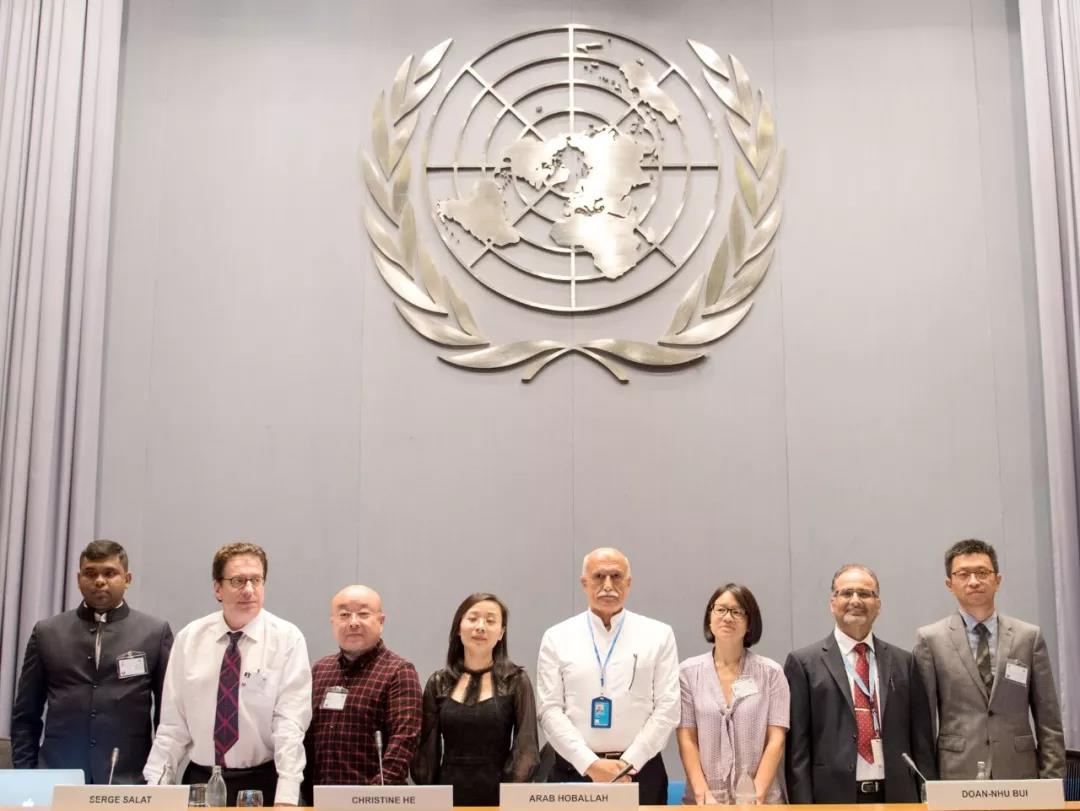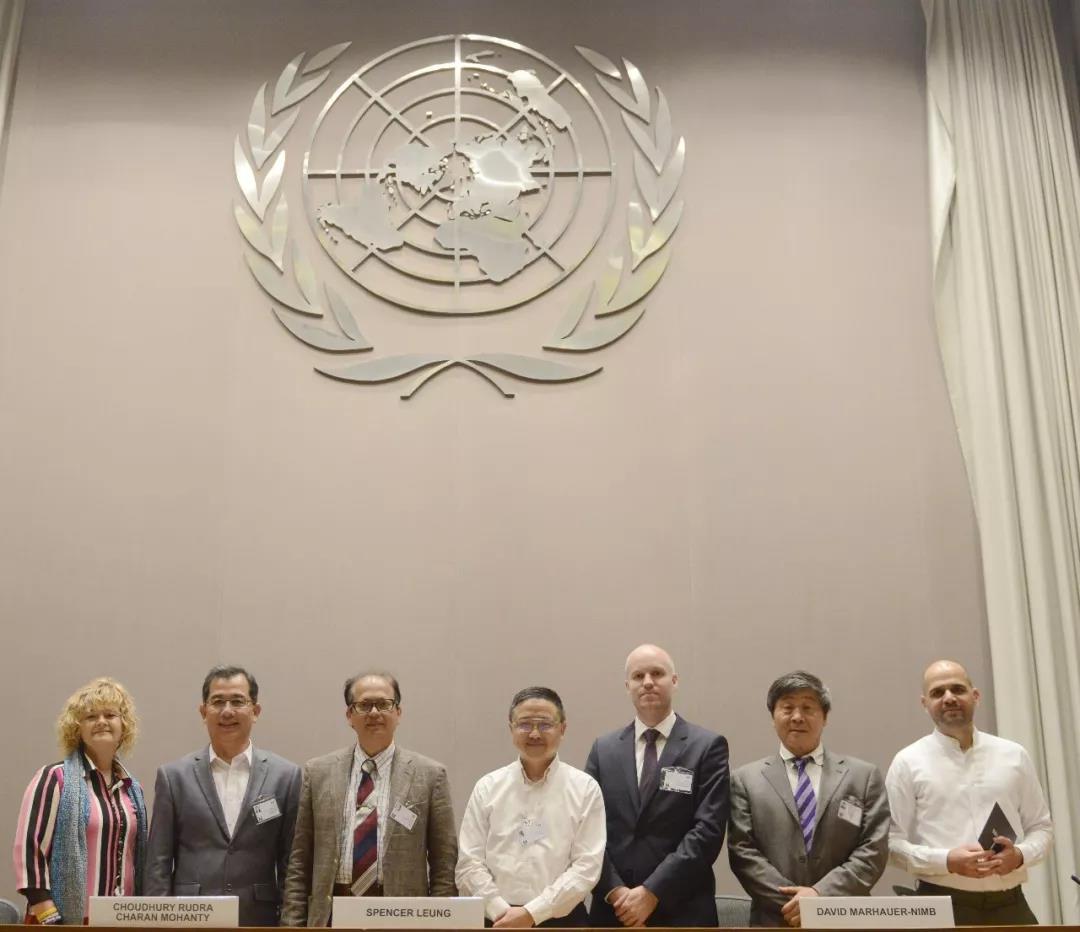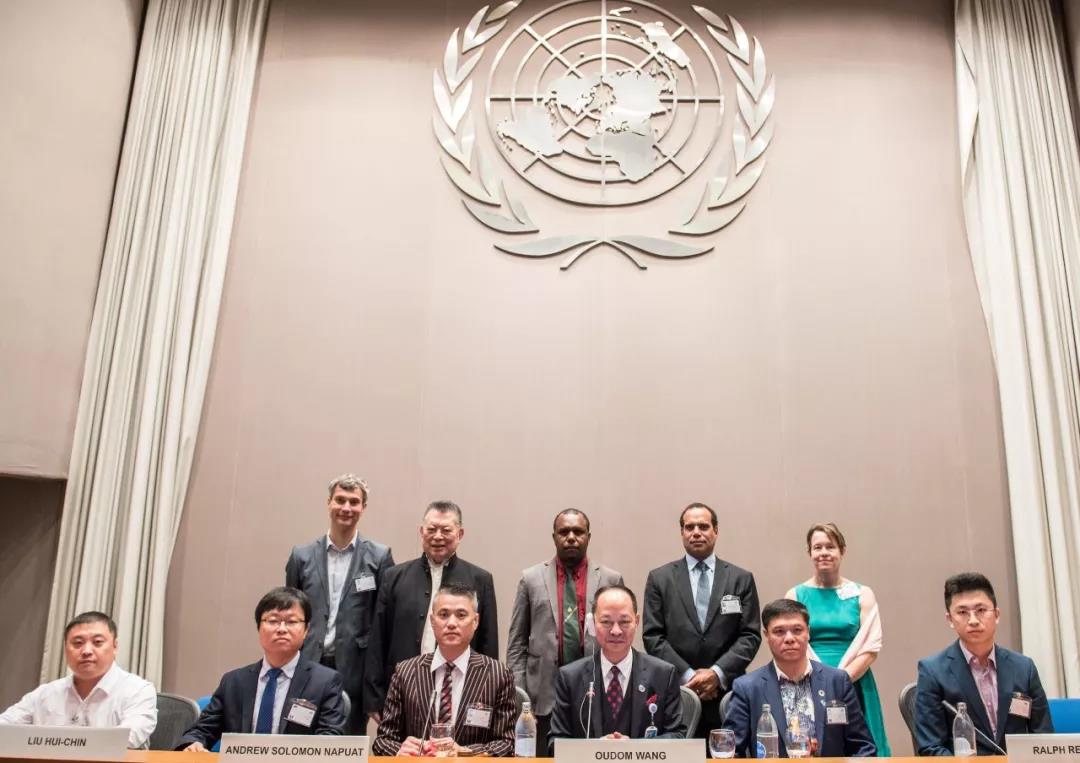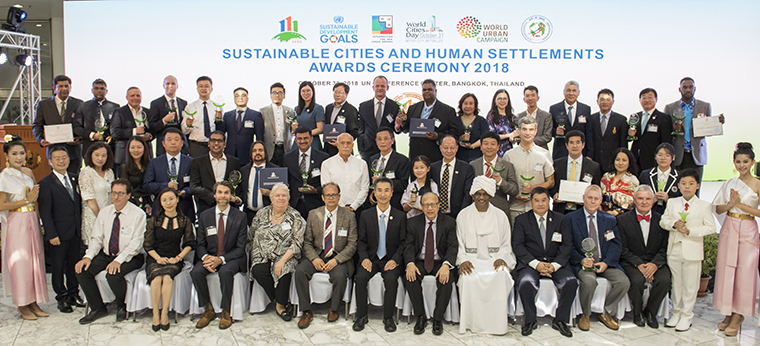Committed to Sustainable Cities and Human Settlements for All
In Special Consultative Status with ECOSOC
Search
Annual2018
2018 Annual Session of Global Forum on Human Settlements calls for urban innovation toward achieving SDG 11 and the New Urban Agenda
Date: October 30-31, 2018
Venue: UN Conference Center, Bangkok, Thailand
Theme: Advance Urban Innovations towards Achieving SDG 11 and New Urban Agenda
Previous
(Bangkok, October 31) The 2018 Annual Session of Global Forum on Human Settlements (GFHS 2018) successfully convened as an important observance of the World Cities Day 2018 at the United Nations Conference Center, Bangkok, Thailand on 30-31October. Mr. Hongjoo Hahm, Officer-in-Charge of the United Nations Economic and Social Commission for Asia and the Pacific attended and addressed the forum.
Group photo of all participants at the opening session
Themed as “Advancing Urban Innovations to Achieve SDG 11 and the New Urban Agenda (NUA)”, the 2-day event brought together over 400 major stakeholders from more than 40 countries for sharing experiences and building partnerships. 13 delegates representing cities, businesses, academia and civil society announced commitments to support sustainable and resilient cities at the forum. The Sustainable Cities and Human Settlements Awards (SCAHSA) were presented to a total of 36 winners, including the city of Hua Hin, Thailand, the city of Indore, India, Kalundborg Symbiosis, Denmark, Qingdao Sino-German Ecopark, China, Arcadis Shelter Program, among others. The awarded practices have made significant contributions to sustainable cities and human settlements for all.
Observance of “World Cities Day 2018” – representatives from various sectors making the commitment to
sustainable urban development at UN Conference Center
Mr. Hongjoo Hahm, Officer-in-Charge of UN ESCAP delivering welcome remarks
At the opening, Mr. Hongjoo Hahm, Officer-in-Charge of the United Nations Economic and Social Commission for Asia and the Pacific emphasized that “innovation as a strategic investment offering benefits to all stakeholders. Our vision of future cities can be powerful. We recognize that cities, supported by strong partners, can foster innovation and build great communities. If we are successful in working toward the objectives of the 2030 Agenda and the New Urban Agenda, we will reshape the cities of the Asia-Pacific region, so they look and function very differently than they do today.”
Ambassador Anwarul K. Chowdhury, Chairman of GFHS, Former UN Under-Secretary-General and High Representative making an opening address
Ambassador Anwarul K. Chowdhury, Chairman of GFHS, Former UN Under-Secretary-General and High Representative highlighted that the magnitude of urban challenges can be overcome to foster parallel opportunities. “We are encouraged as the world leaders adopted by consensus in September 2015 the United Nations 2030 Agenda for Sustainable Development, which included among its 17 Sustainable Development Goals (SDGs), a specific goal – Goal 11 - to make cities and human settlements inclusive, safe, resilient and sustainable. Urbanization offers unprecedented opportunities for increasing living standards, life expectancy and literacy levels, environmental sustainability and more efficient use of increasingly scarce natural resources. For women, urbanization is associated with greater access to employment opportunities, lower fertility levels and increased independence. GFHS strongly advocates for enhanced lasting partnership which not only echoes with SDG 17, but also calls for breaking the political, economic, social, gender and even geographic hierarchy and build up comprehensive, cooperative, pragmatic and equal partnership. This will facilitate implementation of SDGs and NUA.”
Other distinguished guests include Mr. Ralph Regenvanu, Minister of Foreign Affairs, International Cooperation and External Trade of Vanuatu; Mr. Stefanos Fotiou, Director, Environment and Development Division, UN ESCAP; Mr. Oudom Wang, Permanent Representative of Vanuatu to UNESCAP, Chairman of Global One Belt One Road Association; Dr. Taj Hamad, Vice Chairman of Global Forum on Human Settlements; Pol. Lt. Col. Kitibodee Pravitra, Governor of Krabi Province of Thailand, Prince of Thai Royal Family; Mr. Mushtaq Memon, Asia and the Pacific Coordinator for Resources Efficiency Programme, UN Environment; Mr. Choudhury Rudra Charan Mohanty, Coordinator of Environment Programme, UNCRD/UN DESA, Mr. Lu Haifeng, Secretary General of Global Forum on Human Settlements; Dr. Benno Boer, Chief of Natural Sciences, UNESCO Bangkok Office; Mr. Serge Salat, President, Urban Morphology and Complex Systems Institute, Paris, France, Leading Expert of International Green Model City Standards 3.0, Mr. Benson Tam, Chairman of VENTUROUS as well as mayors from different regions, renowned experts and business leaders.
The Forum was organized by the Global Forum on Human Settlements (GFHS) with support from the United Nations Economic and Social Commission for Asia and the Pacific (UNESCAP), in cooperation with the Global One Belt One Road Association (GOBA), World Association of Non-Governmental Organizations (WANGO), Universal Peace Federation (UPF) and other organizations.
GFHS 2018 was designed to enhance capacity building, foster new partnerships and effective actions, and promote cooperation and green development. Critical issues of localizing the SDGs and the NUA were deeply addressed, including resilient and circular economy, building international green model city – urban innovation and green growth, financing for sustainable urban infrastructure, blockchain technology and smart cities, urban water cycle management and SDGs, and eco-city and fabricated buildings.
While the SDGs are global, their achievements will depend on the ability and efforts of local and regional governments and the partnership with stakeholders to make them a reality in cities and communities. As stressed in the Synthesis Report of the UN Secretary General, “many of the investments to achieve the sustainable development goals will take place at the subnational level and be led by local authorities.” SDG 11 calling for sustainable cities and human settlements is the lynchpin of the localizing process of all 17 goals. GFHS 2018 has emphasized not only the great potential of cities to foster innovation and realize green growth, but also the profound significance of well-designed policies, strategies and approaches to maximize the benefits of local actions from city governments, industries and civil societies.
As a highlight of the forum, the Sustainable Cities and Human Settlements Awards Ceremony (SCAHSA) 2018 was unveiled at the United Nations Conference Center in Bangkok. This year’s Global Green City was awarded to city of Hua Hin, Thailand, the Global Green District was given to Qingdao Sino-German Ecopark, China, and Langfang Dachang Movie Town, China was selected as a Global Model on Characteristic Town. Daintree National Park, Queensland, Australia bagged the honor of Global Low-Carbon Ecological Scenic Spot. Global Human Settlements Award on Planning and Design was presented to Mr. Alex Kerr’s rural revival project in Japan through restoring abandoned houses, and Global Human Settlements Model of Green Technology was granted to Climate Drops designed by KT-Energy LLC in Ukraine. The complete list of award winners can be accessed by clicking the link (http://www.gfhsforum.org/Hiring?_l=en).
Visioning Session - Setting the Stage: Enhancing Progress in Achieving SDG 11 and New Urban Agenda
Mayors’ Panel: Safe, Inclusive, Resilient and Sustainable City – policies, actions and practices
Building International Green Model City – Urban Innovation and Green Growth
Resilient and Circular Economy
Blockchain Technology and Smart Cities
Awarders and awardees, Sustainable Cities and Human Settlements Awards Ceremony 2018
Meanwhile, the “International Green Model City (IGMC) Initiative” has drawn a lot of attention through a few interesting activities. To improve public awareness and engagement, the premiere show for IGMC 3-D animation film that was inspired by IGMC Standards 3.0 and produced based on the life of the SaSa family of three provided a quick visual representation of what a smarter, greener, more inclusive city looks like. At the forum, a special training session was conducted to further promote the understanding of IGMC Standards 3.0 and to propel substantive actions of integrating the Standards into urban planning and development. IGMC Standards 3.0 is an assessment and planning tool for sustainable urban development and provides technical means and evaluation methods for the implementation of the 2030 Sustainable Development Agenda and the New Urban Agenda at local and community levels.
On top of that, to coincide with the sub-theme of the “World Environment Day” this year, an exhibition that calls actions on plastic pollution was displayed. It shows on one hand that GFHS has been focused on combating environmental pollution and safeguarding ecosystem services, and on the other hand it helps raise the public awareness and urge all relevant stakeholders to play a part.
With cities, business and all sectors facing old and emerging sustainable development challenges, GFHS 2018 provided most of the solutions for reference. The Forum came to a productive close by setting the way forward and calling to enhance the localization of SDGs and the New Urban Agenda and achieve the transition to green growth through the application of a circular economy approach, scaling up financing for sustainable urban infrastructure, applying blockchain and other innovative technologies for smart cities, improving urban water management, building better, lasting and enhanced partnership and creating international green model city.









